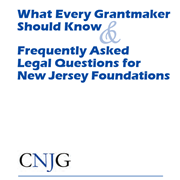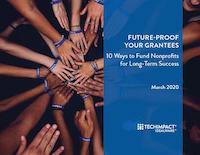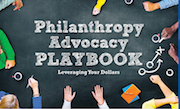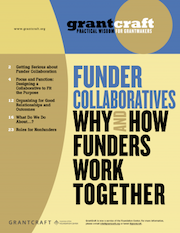Site Search
- resource provided by the Forum Network Knowledgebase.
Search Tip: Search with " " to find exact matches.
In their 2017 book The New Localism, Bruce Katz and Jeremy Nowak make the case that we're at the beginning of a new era: one in which cities and counties must take the lead on new strategies to address pressing social and economic challenges.
But if they hope to be successful, city leaders cannot take on this burden alone: they need to unleash the collective power of their communities. The good news is that a growing number of cities are finding that supporting communities in small ways — for instance, with microgrants — can deliver outsized impact.
Consider the case of the Denver Foundation, which has kept its Strengthening Neighborhoods initiative going for nearly two decades. The initiative provides grants ranging from $100 to $5,000 to fund community-driven solutions that take advantage of the skills and resources already present in a community. Similarly, the Greater Tacoma Community Foundation's Spark Grants program relies on a grassroots leadership model to bring diverse groups together to strengthen local neighborhoods.
The power of small grants to drive change has not been lost on city leaders, many of whom are embracing the potential of micro-philanthropy — and pairing it with a citizen-led ecosystem that supports the effective implementation of those grants. In Newark, we've taken these lessons to heart and are eager to share some of what we've learned about how small grants can help lay a foundation for improved social and economic mobility.

This guide was designed to help the state’s philanthropic community understand their ethical, legal, and fiduciary requirements and obligations.
During 2021 — the second year of the COVID-19 pandemic — 63 distinct charitable organizations in New Jersey and New York received donations totaling $706,325 from the KearnyBank Foundation. The funds were contributed across four specific categories: Education, Quality of Life, Housing and Community.
The five largest contributions were $65,000 to Junior Achievement of New Jersey; $50,000 to Habitat for Humanity of Greater Newark; $50,000 to Chilton Medical Center Foundation; $50,000 to the Kip Center; and $30,000 to the African American Chamber of Commerce of New Jersey.
In the Fairfield-based financial institution’s four categories of giving, $227,525 was granted to organizations under the Quality of Life heading, with $197,300 going to Education, $177,500 to Housing and $104,000 to Community.
“Particularly given the pandemic experience of the past two years, we embrace every opportunity to provide grants through the KearnyBank Foundation,” Craig Montanaro, Kearny Bank’s CEO and president, stated. “We’re able to contribute to these deserving charities because of our company’s ongoing success, and we never take for granted how fortunate we are to be in this position.”
Novartis benchmarked Employee Crisis Programs, and asked fellow corporate funders via the corporate funders listserve to answer the questions below.
- If you have an Employee Crisis Program, what is the name
- Do you manage the program internally or thru a 3rd party? If you use a 3rd party, can you share their name/website and any good/bad experiences.
- Do you only support disasters or other hardships as well?
- What is the average percentage of your employees that apply for aid?
- What is your minimum and maximum funding?
- What is the average amount of aid?
- Do you provide aid directly to the employee and/or vendors?
- Do you allow employees to donate to your fund? If so, how do you promote awareness and what is the employee donation participation rate? Do you match these donations?
- Where does the program reside (CSR, Foundation, HR)?
- Please share guidelines and applications, if possible.
- Please share any other insights.
TD Bank has announced grants totaling $2.8 million in support of efforts to drive a faster, more equitable recovery from the COVID-19 pandemic in vulnerable communities across the United States.
Through the third annual TD Ready Challenge, the bank awarded grants to six U.S. nonprofits working to develop innovative solutions to inequities exacerbated by the pandemic in disproportionately impacted communities.
"The COVID-19 pandemic created a healthcare crisis that exposed social, economic, and racial inequities, and we know it continues to disproportionately impact vulnerable populations across the U.S.," said TD Bank president and CEO Greg Braca. "This year, we focused the TD Ready Challenge competition on organizations that provide innovative solutions to the communities where we live and work."
The Community Foundation of New Jersey (CFNJ) today thanked its 1,160 fundholders for making 7,350 philanthropic gifts to worthy causes and communities in 2022 totaling approximately $153 million. The total dollar amount of grants is a record for the Community Foundation, following annual grantmaking of $103 million in 2021, $87.5 million in 2020, and $57.8 million in 2019.
CFNJ currently stewards over $725 million in charitable assets, making grants to nonprofit organizations in line with the advice of active fundholders or the philanthropic goals of those who leave bequests. Fifty-seven new funds were established in 2022.
Last year marked the final year of grantmaking for the New Jersey Pandemic Relief Fund, which the Community Foundation was proud to host in partnership with First Lady Tammy Murphy.
Philanthropy-serving organizations and their members are eligible for 25% off the subscription price for new subscriptions from Forum members and their member organizations. Inside Philanthropy works every day to explain who's funding what and why. It offers in-depth analyses of foundations and major individual donors found anywhere, along with updates on grants and funding trends.
To receive the discount, use FORUM25 during checkout. When offering this discount to your members, please have them use the same code.

Wouldn’t it be nice if you could fund a single project that would have a positive impact throughout all of your grantees’ programs and services? There is: technology capacity building. Properly supported, the right technologies can build your grantees’ effectiveness and efficiency and multiply the impact of your other grants and programs. Many foundations are reluctant to support technology projects. As a result, many nonprofits are reluctant to directly ask for that support.
Tech Impact Idealware created this guide as a resource to bridge that gap.

Building a Culture of Capitalization in Your Organization, is written for nonprofit arts organizations and shares findings from NFF's study of 36 capital grants made by the Kresge Foundation between 2010 and 2012. Arts organizations interested in building the strength of their balance sheets will find advice for making a capitalization plan, fundraising for different kinds of capital, and implementing new capitalization practices.


In this guide, contributors share strategies for structuring a collaborative to fit its purpose, building strong relationships and resolving conflicts, and figuring out if the collaborative you're in is working. Contributors also offer ample proof that collaboratives are leading the field in bringing the voices of nonfunders — grantees, intended beneficiaries, experts, and others — into the process of making grants.
